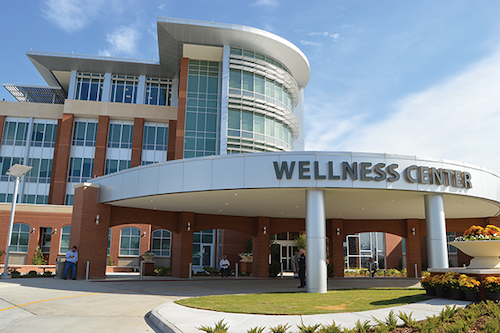A New Way for TGMC
October 17, 2018
Thibodaux Regional’s Momentum Continues On
October 17, 2018A life-threatening injury or illness is cause for concern in any workplace. When the workplace is a hazardous oil platform in a remote onshore or offshore location miles from the nearest hospital, the concern for a worker’s health and safety is heightened.
Houma-based P3 Global Personnel, LLC brings peace of mind to employers with crews on remote job sites through its highly trained medical team of nationally registered and state certified EMT paramedics. These first responders are stationed onsite 24/7 and equipped with customized clinics including a comprehensive medical kit with essential medications and telemedicine capabilities.
“Our medics specialize in remote occupational medicine, so they are able to treat patients onsite and administer life support if needed,” says Belinda Rhodes, P3’s U.S. and GOM operations manager. “Each member of our team holds certification in advanced cardiac life support and prehospital trauma life support to keep a patient stabilized while being transported to a larger medical facility.”
Not every medical concern on an offshore oil platform or other remote worksite will be life-threatening, so P3’s medical team is equipped to treat general illnesses like viruses and infections as well. Treatments are regulated by OSHA and often allow employees to continue working as they recover.
For more advanced cases, medics collaborate with P3’s medical director, Dr. Robert Davis, who is able to examine patients remotely via telemedicine. The entire telemedicine kit can fit inside a standard laptop bag and includes a laptop connected to a USB-powered stethoscope, otoscope and web camera.
“Telemedicine allows Dr. Davis to complete a full assessment of a patient through the Web,” Rhodes says. “He can hear heart and breathing sounds, and can examine the ears, eyes, nose and mouth. He is able to visualize everything the medic is doing in order to make a diagnosis.”
P3’s medical team has used telemedicine to monitor patients with diabetes and cardiovascular conditions globally, from Trinidad to Mozambique. Perhaps more significantly, the technology allows medics to respond to immobile patients.
“If there’s an incident on a deck and the patient is unconscious or can’t move, our medic can bring the telemedicine unit to the patient,” Rhodes says.
Fortunately, worksite emergencies have become less frequent as greater emphasis is placed on safe work procedures. Because safety and health are so closely connected, all of P3’s medics are dually trained as HSE technicians.
“Our medics are out there not only to treat patients but also to ensure everyone is performing safe work practices,” Rhodes says. “We encourage our team to be out with the crew so they can coach them on working safely. They are being proactive in preventing injury and illness from happening, not just sitting in the clinic waiting for someone to get sick.”
Prior to departing for a worksite, P3’s medics consult with project lead for additional training on what to expect in the assigned location. The medics are briefed on common diseases in the area as well as the signs and symptoms that indicate that a worker may be infected. This extra training allows the team to strategically pack their medical kits.
“The idea is to go above and beyond to keep the workers safe and well,” Rhodes says. “The key is to pack according to project specific locations. When going to a project internationally to a high-risk area, medications such as hepatitis B, yellow fever and malaria vaccines are packed.”
Because P3 maintains a global footprint, their medical teams are able to bring U.S.-based equipment and medications into international locations. In addition, the medics are equipped to complete blood analysis and drug testing onsite and relay the results back to Dr. Davis via a low-bandwidth Wi-Fi connection.
Offshore crews with diving personnel are able to receive specialized care from P3’s dive medical technicians, who are certified by the National Board of Diving and Hyperbaric Medical Technology. These medics work with hyperbaric chambers and ensure that divers recover safely.
Furthermore, P3’s medical team is able to assist with land-based hyperbarics for tunneling, supporting air caisson workers. Diver Medical Technicians offer a wide range of services. P3 works with a hyperbaric physician to provide pre-dive physicals. These physicals are complete with blood panel analysts, visual acuity exams, EKG and pulmonary function test. In addition to monitoring and treating conditions that may arise under pressure, P3 is on-site for pre-dive medical screening, immediate post-dive medical screening and 24-hour post-dive physicals. These services are available for both dive and air caisson operations.
“What sets our medical team apart is the customized care we provide to our clients,” Rhodes says. “One incident without a medic onsite could be fatal to a worker. We aim to continually increase our training so workers under our medics’ watch are well taken care of while on the job to ensure their safe return to their families.” •









